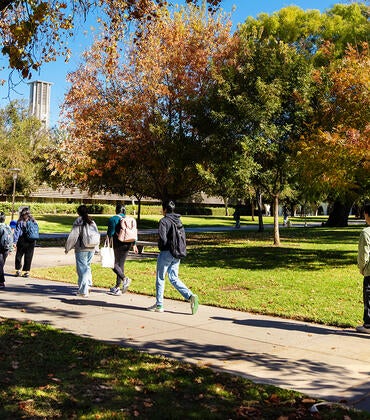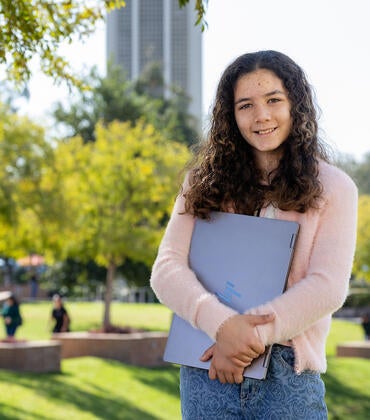
Last summer, Katherine Maldonado, a first-generation graduate student at the University of California, Riverside, became one of 133 recipients nationally of a 2019 Ford Foundation Fellowship.
Maldonado, a UCLA graduate, is now working toward her doctorate in sociology, and her $72,000 Ford Foundation award will support her studies over three years. A Watts native and mother of three sons herself, she examines the experiences of formerly gang-involved women who are now mothers.
In her research, Maldonado explores how these women — who often bear stigmatizing marks of their previous gang affiliations, such as tattoos and criminal records — navigate their lives after leaving gangs, as well as what kinds of resources are and could be made available to help them succeed.
“There’s a gap in the literature and knowledge about what happens to women once they’re out of gangs,” Maldonado said. “We don’t know what happens or what support systems are in place for them and their children. Because of this, it’s usually hard for women to say they’ve completely transitioned out of gangs. Their financial issues don’t just go away, and they often lack support networks, and so they continue living in the same neighborhoods and seeing the same people.”
Maldonado is using her fellowship funding to expand the breadth of her research, which previously focused primarily on women living in Los Angeles. She plans to cross the border, traveling to Tijuana for a better understanding of what happens to formerly gang-involved mothers who are deported from the U.S. and separated from their families.
Maldonado encourages the women she interviews to talk about their lives and transitions out of gang membership using photographs — a technique that’s more conducive to conversation because it “allows them to open up and talk about stories,” she said.
“I share a similar background with many of the women I interview,” she added. “I’m formerly gang-affiliated myself, and I was a teen mom, so I share that experience with the women I interview and find it makes it easier to connect.”
In the future, Maldonado hopes her research will inform public policy for women experiencing violence. Another dream, she said, is to eventually secure funding for neighborhood centers that would help people like the women she works with, who may be on the precipice of leaving gangs, to access the kinds of resources that would ease their transitions.
“I never thought I’d be able to study what I like, help the people I love, and do something about what’s happening to them,” she said. “If my purpose here is to do that, I’ll do it — and make sure I do it right.”
Ford Foundation Fellowships seek to increase the diversity of the nation’s college and university faculties by increasing their ethnic and racial diversity, to maximize the educational benefits of diversity, and to increase the number of professors who can and will use diversity as a resource for enriching the education of all students.
Giving language goes here like this



